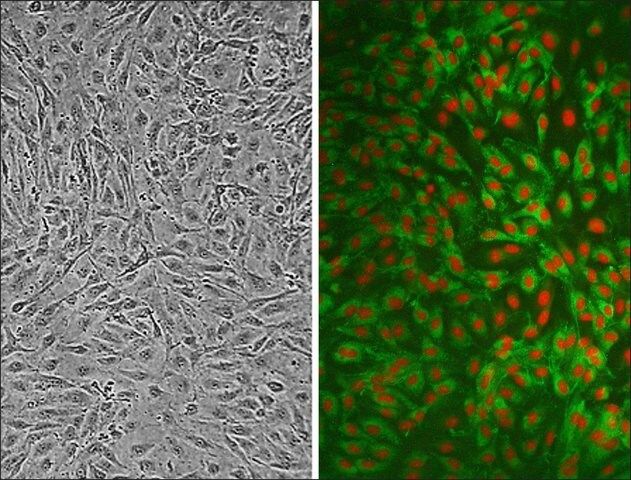您的位置:首页 > 产品中心 > Human Carotid Artery Endothelial Cells: HCtAEC, adult
Human Carotid Artery Endothelial Cells: HCtAEC, adult

产品性质
| Quality Level【质量水平】 | 100 |
| biological source【生物来源】 | human carotid artery (normal) |
| packaging【包装】 | pkg of 500,000 cells |
| growth mode【生长模式】 | Adherent |
| karyotype【核型】 | 2n = 46 |
| morphology【形态学】 | Endothelial |
| technique(s) | cell culture | mammalian: suitable |
| relevant disease(s)【相关疾病】 | cardiovascular diseases |
| shipped in【运输】 | dry ice |
| storage temp.【储存温度】 | −196℃ |
基本信息
| General description【一般描述】 | HCtAEC has been used to elucidate molecular mechanisms of cerebral aneurism caused by haemodynamic (sheer) stress and inflammation, which were shown to act through PGE2-EP2 and NF-κB signaling (Aoki, 2011). Demonstrating a link between inflammation and neovascularization, serum amyloid A, a biomarker of inflammation, increased expression of TNF, F3 factor, NF-κB and VEGF leading to activated migration, wound healing and tube formation responses in HCtAEC; these pro-angiogenic activities could be prevented by pretreatment with the multi-angiokinase receptor inhibitor BIBF1120 (Cai, 2013). Additionally, CD40-CD154 signaling between endothelial cells and T cells leads to a stress response in endothelial cells via activation of NF-κB and MAPK/SAPK pathways and induces down-regulation of APLN, while at the same time activating viral immune surveillance system involving TLR3, IFIH1, RIG-I, and RNASEL (Pluvinet, 2008). Also, HCtAEC, along with human aortic (HAOEC), brachiocephalic artery (HBcAEC), coronary artery (HCAEC) and subclavian artery (HScAEC) have been used to demonstrate that not only blood vessels from different tissues are highly heterogeneous, they also interact differently with leukocytes during the inflammation response (Scott, 2013). The authors further showed that differential N-glycosylation of commonly expressed vascular adhesion molecules may be responsible for this heterogeneity, as well as for modulation of signaling under resting and activated inflammatory conditions. This also explains why specific vascular beds may be more or less susceptible to particular diseases or stimuli. Importantly, if cells from different sources were used, these results could not be convincingly validated due to a number of uncontrolled variables, such as age, race, genetic variability or life style choices of the donors. Because of the complex heterogeneity that exists not only between different donors, but even between different vascular beds in the same individual, it would be prudent to confirm any new findings on primary cell lots coming from several different origins. |
| Cell Line Origin【细胞系来源】 | Artery |
| Application【应用】 | neovascularization, cell migration, wound healing, tube formation, angiogenesis, signal tranduction, monocyte chemotactic factor production, cell adhesion |
| Components【组分】 | Basal Medium containing 10% FBS & 10% DMSO |
| Preparation Note【制备说明】 |
|
| Subculture Routine【传代培养常规】 | Please refer to the HCtAEC Culture Protocol. |
安全信息
| Storage Class Code【储存分类代码】 | 13 - Non Combustible Solids |
| WGK | WGK 3 |





